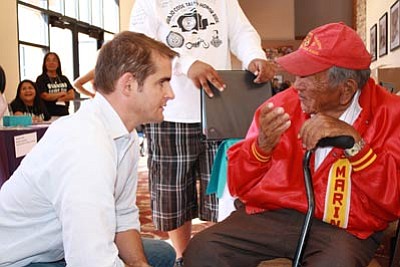VA puts on summit for Navajo and Hopi veterans in Tuba City
The Southwest Region Veterans benefit summit June 19-20 in Tuba City provided an opportunity for veterans to increase their awareness about what services and benefits they earned are available to them.
This was the first summit specifically for the Navajo and Hopi tribes.
Dr. Tommy Sowers, assistant secretary for veterans affairs, said about 150 veterans attended with their family members.
"That's the key, making sure that all veterans know and understand the benefits that they get," Sowers said.
Sowers said the president and the secretary of the interior have dedicated an impressive amount of resources for Native Americans and American Indian outreach for the 566 tribes within the United States. He said the department has agreements with the Indian Health Service and tribal veterans' representatives to help deal with claims and get services to vets quickly.
The highly publicized backlog of claims hits Native Americans just like all other veterans, but Sowers said no veteran, whether they are Native American or American Indian, should have to wait too long for the benefits they get.
"We are seeing progress," Sowers said. "The number of Indian claims, if you consider the entire inventory of claims fell below 800,000. That's the first time that's happened since April 2011."
With about 200,000 Native American veterans across the country, Sowers said regional representatives play a large role in figuring out how to get specific benefits to Native American groups and their diverse communities.
"A couple months ago I was standing on the Bering Strait with Eskimos, most of whom were in the 82nd Airborne and the temperature there was 15 degrees and we were talking about whale hunting and then just last week I was standing in over 100 degrees in the Arizona desert," Sowers said. "We've dedicated an impressive amount of resources to making sure that we are culturally aware and sensitive when we are reaching out."
And Sowers said rural veterans enlist at a disproportionate rate and they go back and live in rural areas. While the government has expanded the number of hospitals, outpatient clinics and vets centers for readjustment and counseling, the VA can't build a facility in every town. The department is moving aggressively forward in telehealth and telemedicine to deliver care in the time and place where veterans live.
"You can't get much more remote than Wales, Alaska, population 152, entirely Eskimo village," Sowers said. "That's our obligation. Once folks raise their hand and say I'm going to serve my country and they do so honorably and they move home, the VA has the obligation to deliver them world class care wherever they are at."
SUBMIT FEEDBACK
Click Below to:




